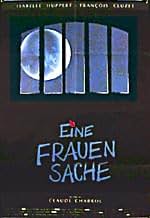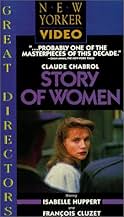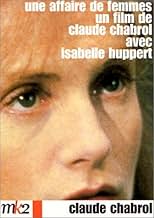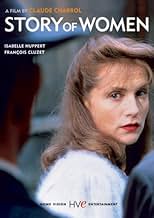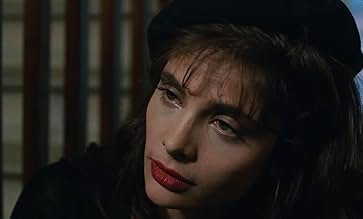VALUTAZIONE IMDb
7,5/10
6139
LA TUA VALUTAZIONE
Nella Francia occupata dai nazisti, una casalinga cerca di sbarcare il lunario quando suo marito torna a casa dopo essere stato ferito in guerra.Nella Francia occupata dai nazisti, una casalinga cerca di sbarcare il lunario quando suo marito torna a casa dopo essere stato ferito in guerra.Nella Francia occupata dai nazisti, una casalinga cerca di sbarcare il lunario quando suo marito torna a casa dopo essere stato ferito in guerra.
- Regia
- Sceneggiatura
- Star
- Premi
- 14 vittorie e 8 candidature totali
Recensioni in evidenza
I'd like to focus on this film as a French film, not of the United States. If one has seen "La Chagrin et la Pitie," then one knows the legacy of this film. France was not perfect during WWII. Not everyone in France was part of the resistance, mainly, they were trying to survive. I think its an amazing film that sheds light on a crucial point in French history. Yes, it's about abortion and Chabrol does a great job ensuring his abortionist is less than perfect. That's a wonderful point he makes, that no one is perfect, not even the moral majority of the government. But, I come away from this film with the same questions that I get from "Lacombe, Lucien," which are: 'what would I have done?' And, please, don't Monday morning quarterback World War II.
Definitely one of director Claude Chabrol's best films, if not his best.
It is based upon a true story out of Nazi occupied France, and stars the incredible Isabelle Huppert (The Piano Teacher, 8 Women). She is supported by Marie Trintignant (Harrison's Flowers), who had her career cut short by an untimely death.
Huppert finds a way to feed her family. She performs abortions and rents out rooms to prostitutes. Everything seems to be going well for her, but her husband is not happy about the fact that he hasn't had any in 10 years, and she now has a lover - he turns her in.
France is now rid of the Germans and is trying to restore her morality. Unfortunately, Marie to be made an example.
Huppert was great, and Trintigant was also very good.
It is based upon a true story out of Nazi occupied France, and stars the incredible Isabelle Huppert (The Piano Teacher, 8 Women). She is supported by Marie Trintignant (Harrison's Flowers), who had her career cut short by an untimely death.
Huppert finds a way to feed her family. She performs abortions and rents out rooms to prostitutes. Everything seems to be going well for her, but her husband is not happy about the fact that he hasn't had any in 10 years, and she now has a lover - he turns her in.
France is now rid of the Germans and is trying to restore her morality. Unfortunately, Marie to be made an example.
Huppert was great, and Trintigant was also very good.
Claude Chabrol's "Une affaire de femmes" takes us back to the challenging times of World War II, exploring the life of Marie, portrayed with depth and complexity by Isabelle Huppert. Set against the backdrop of a war-torn France, the film delves into the moral intricacies of survival, collaboration, and the consequences of one woman's choices.
The narrative unfolds as Marie, left alone with her two children during the wartime, faces the grim reality of a defeated nation. Huppert's performance brings a nuanced portrayal of Marie as she navigates through a tumultuous period, discovering her unexpected skill in performing abortions, a secret source of income during these dire times.
The film refrains from passing moral judgment on Marie's actions, leaving room for the audience to grapple with the ethical complexities of her decisions. François Cluzet complements Huppert's portrayal with his role as Marie's husband, whose jealousy and actions set the stage for the unfolding tragedy.
Chabrol, a master of suspense and a seasoned storyteller, weaves a narrative that transcends the specifics of its wartime setting. The movie serves as a poignant commentary on the broader themes of collaboration, morality, and the resilience of the human spirit in the face of adversity.
"Une affaire de femmes" captures the essence of Claude Chabrol's ability to dissect societal norms and individual choices. The film, although set against the backdrop of WWII, resonates with timeless themes, leaving the audience with much to contemplate. Huppert's compelling performance, supported by a strong cast, makes this film a standout in Chabrol's body of work.
The narrative unfolds as Marie, left alone with her two children during the wartime, faces the grim reality of a defeated nation. Huppert's performance brings a nuanced portrayal of Marie as she navigates through a tumultuous period, discovering her unexpected skill in performing abortions, a secret source of income during these dire times.
The film refrains from passing moral judgment on Marie's actions, leaving room for the audience to grapple with the ethical complexities of her decisions. François Cluzet complements Huppert's portrayal with his role as Marie's husband, whose jealousy and actions set the stage for the unfolding tragedy.
Chabrol, a master of suspense and a seasoned storyteller, weaves a narrative that transcends the specifics of its wartime setting. The movie serves as a poignant commentary on the broader themes of collaboration, morality, and the resilience of the human spirit in the face of adversity.
"Une affaire de femmes" captures the essence of Claude Chabrol's ability to dissect societal norms and individual choices. The film, although set against the backdrop of WWII, resonates with timeless themes, leaving the audience with much to contemplate. Huppert's compelling performance, supported by a strong cast, makes this film a standout in Chabrol's body of work.
'Une affaire de femmes' (the English distribution title was 'Story of Women'), Claude Chabrol's 1988 film gives Isabelle Huppert the opportunity to create one of the most memorable roles of a formidable career. Chabrol, the director about whom Huppert would posthumously say that he filmed her like a father, sets his drama in the period of World War II and the occupation, bringing to screen the biography of the last woman to be sentenced to death and executed in the history of France. The charge was the practice of illegal abortions, and the exemplary punishment was a consequence of the moral and national decay of the Vichy collaborationist regime. The pro-life vs. Pro-choice are still current in many countries of the world today (not in France), but that is not the main theme of the film. In fact, Chabrol avoids any moral judgment on one side or the other of this dispute. His target is - as in many of his other films - the French bourgeoisie during the war, in one of the most abysmal periods of its history, a period marked by collaboration, corruption, immorality and hypocrisy.
The story takes place in the months and the first years after the defeat of France, the occupation of part of the country's territory and the installation in Vichy of a collaborationist government under the leadership of Marshal Petain. Marie is one of many young women left behind alone with two children to care for after her husband leaves for war. She is a simple woman living in a provincial town whose dreams of becoming a singer or even of leading a normal life have been dashed by the war. Somewhat by chance, while helping a neighbor friend, she discovers her ability to perform abortions. The return of her husband does not improve the family situation, on the contrary. Paul, traumatized by the war, becomes an extra burden, and any spark of love that may have existed between the two is now extinguished. Marie decides to turn her talent for helping other women into a source of income. There is no shortage of opportunities. Many women left alone are forced to look for support among occupiers or collaborators, and the children resulting from these relationships are unwanted burdens and risk compromising the mothers morally and socially. Marie's business prospers, the woman begins enjoy her better life, she also takes a lover, while asking herself few questions about what she is doing. However, the jealous husband does not accept the situation.
Isabelle Huppert is perfect in such roles, where facts are ambiguous and feelings repressed. Neither the screenwriters nor the director insist on making any moral judgment about the woman's actions. When she is caught, tried and condemned by a system that wants to make her a punishable example of immorality, the filmmakers' compassion seems to shift more towards the children left behind and destined to remain motherless. Huppert's Marie combines innocence with carelessness, love for children with a desire to live her life at all costs. It's a complex and interesting character, one of the best roles of his career. François Cluzet is her acting partner as the husband whose deeds as a sort of catalyst for the woman's downfall. As for Chabrol, during this period he had filtered and decanted all the lessons of New Wave cinema and had reached a remarkable efficiency and acuity of his means of expression - both in writing the story (inspired by a book by Francis Szpiner - jurist and politician, nowadays mayor of a Parisian arrondissement) but also in working with the camera. With restraint and without pathos, 'Une affaire de femmes' is one of the harshest cinematic indictments of French collaborationism and a statement of compassion for its victims.
The story takes place in the months and the first years after the defeat of France, the occupation of part of the country's territory and the installation in Vichy of a collaborationist government under the leadership of Marshal Petain. Marie is one of many young women left behind alone with two children to care for after her husband leaves for war. She is a simple woman living in a provincial town whose dreams of becoming a singer or even of leading a normal life have been dashed by the war. Somewhat by chance, while helping a neighbor friend, she discovers her ability to perform abortions. The return of her husband does not improve the family situation, on the contrary. Paul, traumatized by the war, becomes an extra burden, and any spark of love that may have existed between the two is now extinguished. Marie decides to turn her talent for helping other women into a source of income. There is no shortage of opportunities. Many women left alone are forced to look for support among occupiers or collaborators, and the children resulting from these relationships are unwanted burdens and risk compromising the mothers morally and socially. Marie's business prospers, the woman begins enjoy her better life, she also takes a lover, while asking herself few questions about what she is doing. However, the jealous husband does not accept the situation.
Isabelle Huppert is perfect in such roles, where facts are ambiguous and feelings repressed. Neither the screenwriters nor the director insist on making any moral judgment about the woman's actions. When she is caught, tried and condemned by a system that wants to make her a punishable example of immorality, the filmmakers' compassion seems to shift more towards the children left behind and destined to remain motherless. Huppert's Marie combines innocence with carelessness, love for children with a desire to live her life at all costs. It's a complex and interesting character, one of the best roles of his career. François Cluzet is her acting partner as the husband whose deeds as a sort of catalyst for the woman's downfall. As for Chabrol, during this period he had filtered and decanted all the lessons of New Wave cinema and had reached a remarkable efficiency and acuity of his means of expression - both in writing the story (inspired by a book by Francis Szpiner - jurist and politician, nowadays mayor of a Parisian arrondissement) but also in working with the camera. With restraint and without pathos, 'Une affaire de femmes' is one of the harshest cinematic indictments of French collaborationism and a statement of compassion for its victims.
Though I had owned this on VHS (recorded off French TV), I only opted to check it out now – after acquiring the film in a version accompanied by English subtitles, on the occasion of its director's birthday. While not a typical effort (being a period melodrama and based on fact to boot), in retrospect, it is justly considered among Chabrol's finest.
Star Isabelle Huppert (in one of her best performances, playing an essentially unsympathetic if pitiable type) received the Best Actress award at the Venice Film Festival for her work here. Interestingly, I would 'meet' Chabrol there in 2004 where the winning film that year happened to deal with the exact same subject as STORY OF WOMEN – the controversy regarding the practice of abortion, i.e. Mike Leigh's VERA DRAKE! Co-star Francois Cluzet, who acts pretty much as second-fiddle to Huppert in this case, would eventually come into his own under Chabrol's guidance in the similarly excellent L'ENFER (1994). The film, however, also provides a notable showcase for Marie Trintignant in the role of Huppert's prostitute friend; again, the actress would subsequently be promoted to lead status for the same director's BETTY (1992), which I have just watched and reviewed.
STORY OF WOMEN, then, makes for compelling viewing in several different keys: as a character study (Huppert wants to be a singer, refuses to sleep with her ex-P.O.W. husband but then takes a much younger lover, of course offers her services to girls 'in trouble' and ultimately renounces her faith while in prison), as a look at war-torn France (though the Nazis are hardly ever in the foreground, the hardships endured by the locals obviously have a lot to do with how they are 'forced' to behave) and as a critique, in the vein of Costa-Gavras' movies, of the justice system (there is no doubt Huppert was at fault but the punishment meted out, to set an example and uphold the country's moral rectitude to counter the dishonor of occupation, was too extreme). Oddly enough, once the husband exposes her to the authorities for rather selfish reasons to begin with, he basically exits the picture and is never shown feeling any kind of remorse.
For the record, Chabrol had already treated a cause célèbre in VIOLETTE NOZIERE (1978; which I will get to soon in my ongoing marathon, since I am actually approaching it in reverse chronological order!) and would do so again in the recent A GIRL CUT IN TWO (2007; that I have already viewed and commented upon).
Star Isabelle Huppert (in one of her best performances, playing an essentially unsympathetic if pitiable type) received the Best Actress award at the Venice Film Festival for her work here. Interestingly, I would 'meet' Chabrol there in 2004 where the winning film that year happened to deal with the exact same subject as STORY OF WOMEN – the controversy regarding the practice of abortion, i.e. Mike Leigh's VERA DRAKE! Co-star Francois Cluzet, who acts pretty much as second-fiddle to Huppert in this case, would eventually come into his own under Chabrol's guidance in the similarly excellent L'ENFER (1994). The film, however, also provides a notable showcase for Marie Trintignant in the role of Huppert's prostitute friend; again, the actress would subsequently be promoted to lead status for the same director's BETTY (1992), which I have just watched and reviewed.
STORY OF WOMEN, then, makes for compelling viewing in several different keys: as a character study (Huppert wants to be a singer, refuses to sleep with her ex-P.O.W. husband but then takes a much younger lover, of course offers her services to girls 'in trouble' and ultimately renounces her faith while in prison), as a look at war-torn France (though the Nazis are hardly ever in the foreground, the hardships endured by the locals obviously have a lot to do with how they are 'forced' to behave) and as a critique, in the vein of Costa-Gavras' movies, of the justice system (there is no doubt Huppert was at fault but the punishment meted out, to set an example and uphold the country's moral rectitude to counter the dishonor of occupation, was too extreme). Oddly enough, once the husband exposes her to the authorities for rather selfish reasons to begin with, he basically exits the picture and is never shown feeling any kind of remorse.
For the record, Chabrol had already treated a cause célèbre in VIOLETTE NOZIERE (1978; which I will get to soon in my ongoing marathon, since I am actually approaching it in reverse chronological order!) and would do so again in the recent A GIRL CUT IN TWO (2007; that I have already viewed and commented upon).
Lo sapevi?
- QuizBased upon the true story of Marie-Louise Giraud, with character names changed.
- Colonne sonoreLe Poème de l'Amour et de la Mer
Written by Ernest Chausson
I più visti
Accedi per valutare e creare un elenco di titoli salvati per ottenere consigli personalizzati
- How long is Story of Women?Powered by Alexa
Dettagli
- Data di uscita
- Paese di origine
- Sito ufficiale
- Lingue
- Celebre anche come
- Story of Women
- Luoghi delle riprese
- Coulommiers, Seine-et-Marne, Francia(interiors: women's prison)
- Aziende produttrici
- Vedi altri crediti dell’azienda su IMDbPro
Botteghino
- Lordo Stati Uniti e Canada
- 438.483 USD
- Tempo di esecuzione1 ora 48 minuti
- Mix di suoni
- Proporzioni
- 1.66 : 1
Contribuisci a questa pagina
Suggerisci una modifica o aggiungi i contenuti mancanti

Divario superiore
By what name was Un affare di donne (1988) officially released in India in Hindi?
Rispondi

